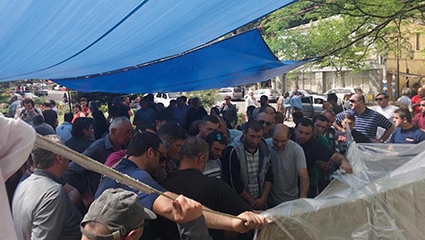Georgian Miners Fail to Reach Consensus with Employer
Around 3000 workers of a manganese mine in Chiatura, who went on strike on May 15, failed to reach consensus with their employer company, Georgian Manganese Holding (GMH), and are continuing their protests.
The parties failed to reach an agreement on the main demand of the protesters, a 50% pay rise, and the miners left the meeting in protest. Rustavi 2 TV reports that the miners were willing to compromise with the company's administration and agreed to increase their salaries by 30% instead of 50% if the remaining 20% salary rise would be seen in the future. However, according to the TV channel, the company's administration refused to accept the offer and are still offering 25% increase in salaries.
Protesters marched through the town and called on the population once again to join the strike and support them. A rally is underway in front of the City Council building where the protesters have placed tents and continue a hunger strike.
Before the meeting between the miners and the GMH representatives, one worker who is on hunger strike became unwell and was transferred to hospital. The miners claim the rally will continue until their demands are met.
Chiatura miners are supported by the employees of the Tkibuli coal mines, who joined the protesters in Chiatura and called on the authorities to ensure fair working conditions and a decent salary for the miners.
In addition to the increased salaries, the miners ask for an improved life insurance package, prohibition of heavy truck movement in the town, and guarantees that the leadership of the company GMH will not carry out disciplinary measures against them after the strike is over.
The Public Defender of Georgia, Nino Lomjaria, met the miners on strike in Chiatura to hear more about their demands on the improvement of labor conditions and security. According to Lomjaria, the Ombudsman's Office does not have a full mandate on all the issues the miners are discussing, but says the miners' work schedule is not in line with the Labor Code of Georgia.
“We will thoroughly study the working hours and working regime of the miners. I was told they have a 12-hour regime over two weeks, which I believe is contrary to the terms of the labor legislation which sets the maximum working hours. Moreover, they have to work in unsafe and hazardous conditions,” the Public defender stressed.
Human Rights Watch (HRW), an international non-governmental organization based in New York, also commented on the case last week.
NGO HRW conducted research on the working conditions in extractive industries in Georgia, and heard how miners, like those on strike, work shifts of 15 consecutive days, working 12 hours a day underground, including at night.
The organization stressed that the manganese company should listen carefully to workers’ complaints and take steps to ensure safe and fair working conditions. They also demanded Georgia bring its labor code in line with International Labor Organization standards and put in place a full labor inspectorate with powers and resources to monitor and enforce all labor rights.
However, Georgian Manganese believes the miners’ strike goes beyond legal frames and says their demand for a 50% pay rise is unacceptable. They have said they will take the case to court.
By Thea Morrison
Image source: Netgazeti











